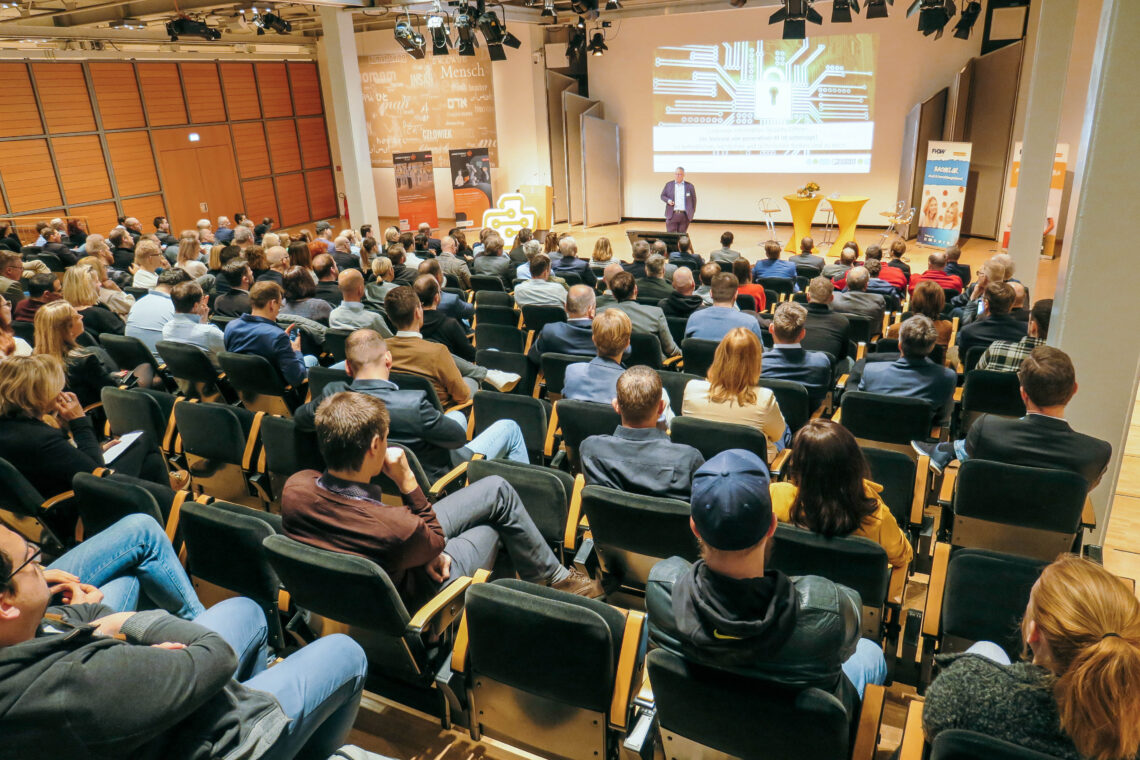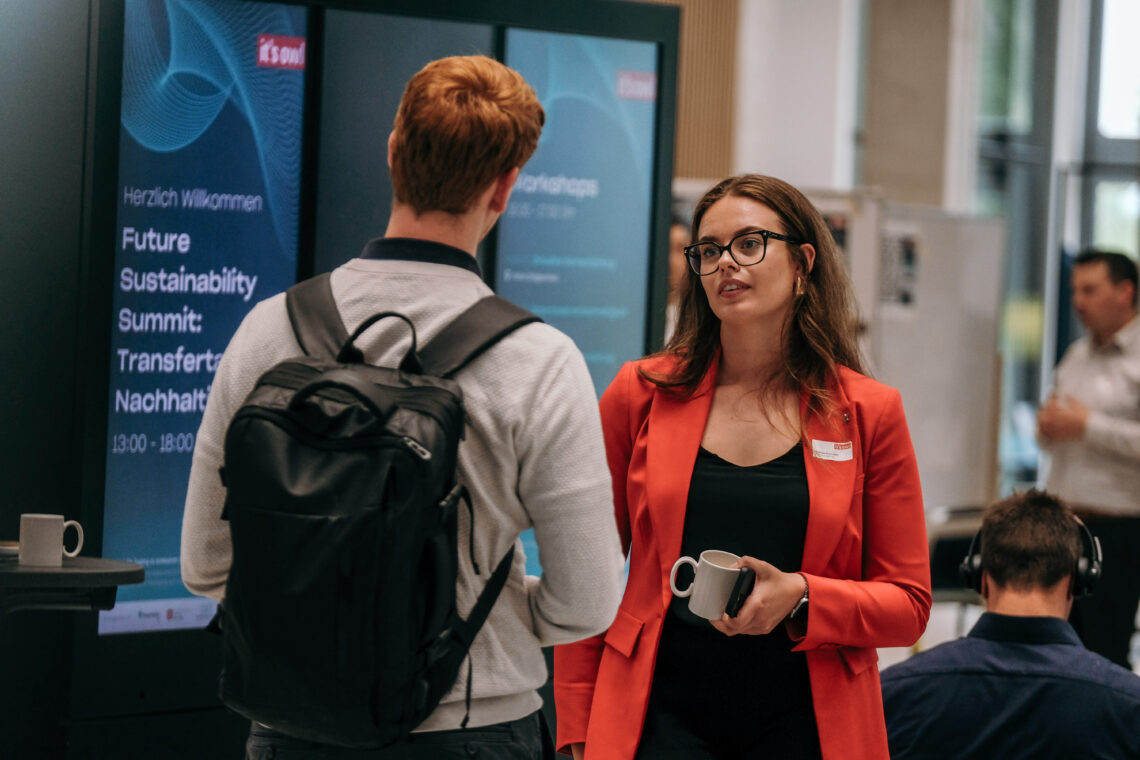
AI for SMEs: “If you don’t start now, you’ll hardly catch up later”
“The use of artificial intelligence also holds great potential for small and medium-sized companies. However, there are still major deficits in their knowledge of practical implementation, legal aspects and risks,” said Professor Dr. Eckhard Koch at the kick-off event for the “AI Journey” at the Heinz Nixdorf MuseumsForum. Around 200 managing directors and executives from all over OWL attended the ‘AI Breakfast’, organized for the second time by the Paderborn University of Applied Sciences (FHDW) as part of the it’s OWL imitated competence center Arbeitswelt.Plus, to find out about current AI technologies and applications.
“In addition to teaching, we have built up a very practice-oriented research area in recent years, including a focus on artificial intelligence,” reported the FHDW President and Head of Research, Development and Transfer. The FHDW is currently working with corporate partners on projects such as dyke monitoring, drone use for forest protection, optimization of service hotlines, knowledge management and AI-supported wound assessment in nursing.
“Our research is very application-oriented. At the end of a project, we always come up with a product that can be used in practice,” emphasized Koch. “We are now bringing this AI expertise to companies with our series of events funded by the Federal Ministry of Education and Research.”
Start now – otherwise it will be difficult to catch up
“If you don’t start working with artificial intelligence now, you will hardly be able to catch up later,” said Professor Dr. Christian Ewering. The Dean of Computer Science at the FHDW, who is responsible for AI lighthouse projects, provided a comprehensive overview of AI technologies and their applications. “Fundamentally, AI requires processes to be thought about differently and problems to be approached differently,” he said.
AI systems for forecasting, classification and generation could often provide better and more efficient solutions. However, the training effort also increases with the model quality. The quality depends on the number of documents and how up-to-date they are, for example. “As AI is a statistical system, it naturally also has statistical errors,” Ewering pointed out. The statements made by generative systems would have to be checked depending on the application. “For example, I wouldn’t fly in an airplane controlled exclusively by AI,” he joked.

Small steps instead of big leaps
“Start using AI in your company with small, sensible steps by defining an initial use case,” advised the AI specialist. “Gain experience and bring in external expertise for the beginning.” Sufficient personnel capacities and genuine AI expertise are crucial. “Our students in the ‘Artificial Intelligence & Data Science’ department have already spent around 1,600 hours on AI and AI-related topics by the time they graduate.”
Practical report: AI integration at Phoenix Contact
Thomas Bischoff reported on the structured introduction of AI use at Phoenix Contact in Blomberg. The company uses AI applications to optimize production and sales, in the administrative area and for video translation, among other things. “But if you only see the use cases, you’re not thinking far enough,” the Corporate AI Manager made clear. In order to enable the compliant use of generative AI, a dedicated team of experts was mobilized in 2023.
“The opportunities for companies through the use of AI are huge, but there are also obligations, for example with regard to the European AI Act,” said Bischoff, explaining the complex procedure. The works council was also involved from the outset. “At Phoenix Contact, we have jointly developed a company-wide guideline for the use of generative AI and at the same time focus on the transparent use of AI,” reported Bischoff. “Among other things, the introduction of new AI application scenarios is regulated by clearly defined processes.” Regular and intensive communication with all employees is also particularly important. “This is time-consuming, but indispensable.”
Legal uncertainties remain
“We can only scratch the surface of the legal assessment today,” emphasized Dr. Daniel Wittig from the Paderborn law firm Brandi. The specialist lawyer for IT law made it clear that there are still many unanswered questions surrounding AI. “So we always have to look at the individual case.” For the legal assessment of the use of AI in companies, various legal framework conditions must be observed.
“One of these is the General Data Protection Regulation, because AI needs as much data as possible for training, so there is a fundamental conflict here.” In principle, the regulation only permits the use of personal data with the express consent of the data subjects. “In AI projects, data protection should therefore be considered right from the start.”
The AI Act and future liability issues
Wittig also provided information on the new EU Artificial Intelligence Act, which regulates the use and marketing of artificial intelligence in a standardized manner for the entire EU. Key provisions and bans have been in force since February 2, 2025, and others will be gradually implemented by August 2027. “New framework conditions apply to AI systems according to their risk classification: from use without regulation, through regulation and transparency obligations, to a ban,” he explained. “Do not rely on the fact that your application falls into the unregulated minimum risk area, but be sure to carry out a risk assessment.”
Wittig pointed out that copyright issues and the protection of trade secrets also need to be addressed, particularly for the use of generative AI. “The new AI Liability Directive, which is currently still in the legislative process, will also be important for companies in the future,” he concluded. “Among other things, this law will make the burden of proof much easier for injured parties through a disclosure obligation and a presumption of causality that must be rebutted.”
Further events for companies
As part of the AI journey, further free events will be held until June on special topics for managers from the HR, cyber security and creative sectors. Information on the entire ‘AI journey’ at www.fhdw.de/KI








